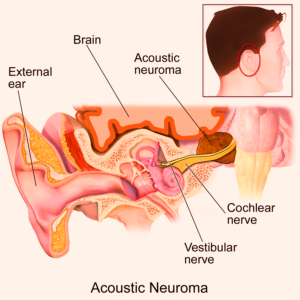When an acoustic neuroma encroaches on the brainstem, this is when things start getting really dangerous, and symptoms can be quite variable.
Anything that presses on the brainstem is a very serious matter.
An acoustic neuroma begins with an overgrowth of the Schwann cells that cover the eighth cranial nerve as a protective kind of wrapping.
This location is very close to the brainstem, unfortunately.
So if the tumor grows and is not treated…the brainstem will be in is path.
Possible Symptoms of Acoustic Neuroma on Brainstem
• Headache (usually persistent)
• Balance problems, unsteadiness
• Impaired control of voluntary body movements
• Confusion
• Visual problems
But an acoustic neuroma that’s in contact with the brainstem – in the early stages of this contact – will not always cause symptoms.

Blausen.com staff (2014)/CC BY 3.0/creativecommons.org/licenses/Wikimedia Commons
“Tumors of any size can be discovered incidentally including very large tumors with significant brainstem compression,” says Brandon Isaacson, MD, F.A.C.S., Department of Otolaryngology – Head and Neck Surgery, UT Southwestern Medical Center, Dallas, TX.
Dr. Isaacson is one of the few surgeons in the U.S. who removes small acoustic neuromas via endoscopy: insertion of a thin tube through the inner ear, guided by a camera that displays the internal image on a screen.
The only incision required is a small one in the ear canal.
Dr. Isaacson continues, “These tumors are in most cases slow growing, and early symptoms are often not addressed by the patient and the clinician.
“If a tumor grows very slowly the brain tends to tolerate this well, but a faster growing tumor will typically present earlier.
“Rarely there can be bleeding within the tumor that can cause rapid expansion and severe symptoms.”
An acoustic neuroma is benign (won’t spread throughout the body), but left untreated, it can cause local and serious harm that involves the brainstem.













